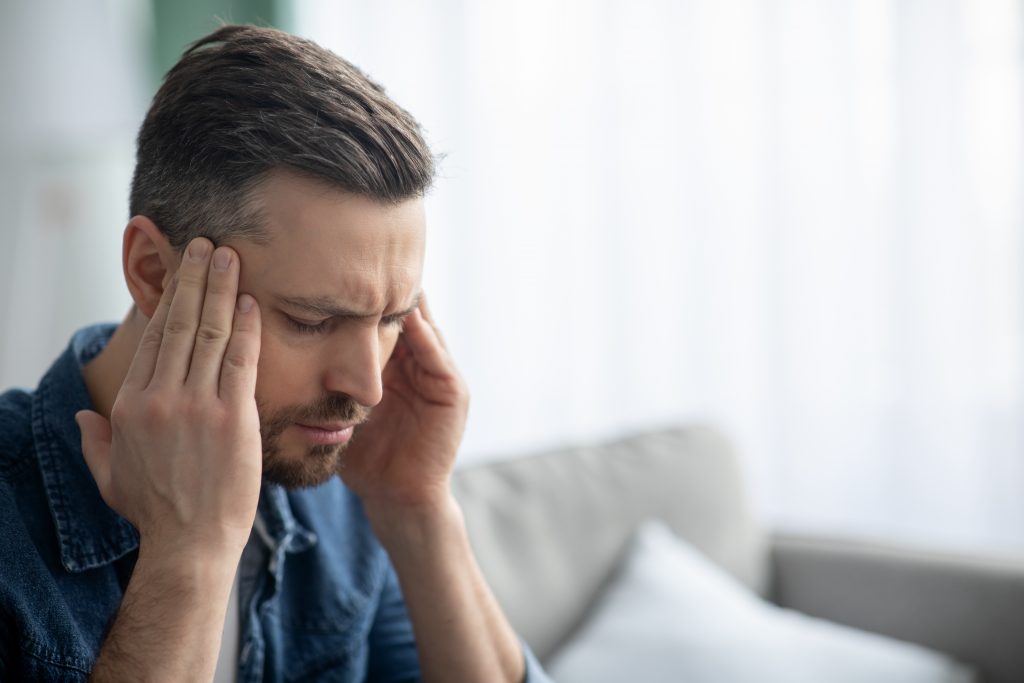December 1, 2022
Covid-19 Headache Relief
Covid-19 has affected millions of people worldwide since it first appeared in 2019. One of the confounding things about the virus is how differently it presents in different individuals. Respiratory symptoms like coughing and congestion are common signs of covid, as is the loss of taste or smell. Another symptom that has emerged as a common sign of covid-19 is a headache.
Experts aren’t certain why headaches are so common with covid-19 infections. They may occur because of fever and dehydration caused by your body’s efforts to fight off the virus. Some headaches may be related to the inflammatory response that the virus triggers in many people. In other cases, covid-19 may have neurological effects that lead to pain and headaches. For many, finding treatment for covid headache relief is an important part of recovering from the virus. This article will discuss how to get rid of a covid headache.
Headaches and Covid-19
Doctors and scientists have observed that headaches are common among people who have tested positive for the covid-19 virus, though how common isn’t entirely clear. One recent review of covid-19 research suggested that between 10% and 70% of covid-19 patients have a headache as part of their symptoms.
The research shows that covid-19 headaches are most similar to either tension headaches or migraines. The symptoms of tension-like headaches include:
- Moderate or severe pain

- Pain on both sides of the head
- A sense of pressure on the forehead, on the sides of the head, or around the eyes
- Symptoms that don’t respond well to over-the-counter pain medications
The symptoms of migraine-like headaches include:
- Pain usually isolated to one side of the head
- A throbbing or pulsing sensation
- Sensitivity to environmental triggers such as light, sound, smell, or touch
- Nausea and vomiting
Some people have found that headaches from covid-19 are more painful than headaches they have had in the past. The headaches may also last longer and not respond as well to normal headache treatments.
Simply having a headache that feels like a migraine or tension headache doesn’t necessarily indicate that you have covid-19. However, an unusual headache that’s accompanied by other symptoms of covid-19 could be an indication that you have the covid-19.
How to Treat a Covid-19 Headache
If you test positive for covid-19, you should follow the appropriate isolation guidance from your doctor or local health department. If your symptoms remain mild, you should be able to manage them at home using over-the-counter medicines and plenty of rest. For treatment, you can try home care methods known to help a covid headache such as:
Medication: You may find covid headache relief by using over-the-counter medication like ibuprofen or acetaminophen. Follow the printed dosing directions or ask your doctor about the appropriate dose. If you take prescription medications, ask your doctor or pharmacists if there are age restrictions on using OTC pain meds with your other medications.
Cold compresses: Some people find that holding a cold compress to their head helps reduce the effects of a headache during covid-19. You can use a washcloth soaked in cold water. You can also use an ice pack wrapped in a towel to protect your skin.  Do not put ice directly on your skin, as it can result in injury, such as frostbite if you leave it there too long.
Do not put ice directly on your skin, as it can result in injury, such as frostbite if you leave it there too long.
Warm showers: If the headache is caused by sinus congestion, you may find that breathing warm, steamy air provides some relief. The warm, humid air in a shower can loosen the mucus in your sinuses and help it drain to relieve the pressure.
Rest and fluids: If you have a fever or you are taking medication to prevent congestion, you should drink plenty of fluids. Fever and certain medicines cause dehydration, which can cause or exacerbate headaches. Non-alcoholic beverages without caffeine help rehydrate you. You can try drinking water, fruit juice, or sports drinks. In addition, getting plenty of rest can help with your recovery and resolve symptoms of covid-19, including headaches.
Typically, covid-19 symptoms start to resolve in a week to ten days. Most people find that they feel better after that, and any covid-related headaches stop being a concern.
Headaches and Long Covid
One of the concerns with covid-19 is the occurrence of long-covid. Some people experience symptoms for weeks or months after their initial infection. Symptoms can range from residual fatigue and coughing to brain fog and memory problems. Headaches are a common long-covid symptom, even among people who have never had consistent problems with headaches before.
Unfortunately, doctors and researchers don’t yet fully understand why some people develop long covid symptoms, nor are there any known cures for the condition. When long covid causes headaches, experts recommend managing them to alleviate symptoms. Over-the-counter medications can be helpful for long-covid-related headaches. If those don’t work, you can talk to a doctor about trying prescription-strength medications. Migraine treatments can be useful for migraine-type headaches related to long covid.
You may be able to identify triggers that bring on long-covid headaches. Certain foods, activities, or substances may cause headache symptoms to appear. Keeping a headache journal may help you determine activities or foods that lead to headaches so you can avoid them in the future.
You can also ask your doctor about trying complementary or alternative treatments for persistent headaches from long covid. Some people find relief from treatments such as acupuncture or massage. Talk to your doctor first to make sure any alternative treatments you try won’t negatively affect other treatments you are using.
When to Call a Doctor for a Covid-19 Headache
In rare cases, covid-19 headaches are related to blood clots. These are potentially dangerous situations that require immediate medical attention. Call your doctor if you have a headache accompanied by any of the following symptoms:
- A severe headache that does not improve when you take medication

- Pain that continues to worsen, particularly when you lie down or bend over
- Changes to vision
- Nausea and vomiting
- Speech problems, muscle weakness, drowsiness, or seizures
- A rash that looks like a bruise
- Shortness of breath or chest pain, or abdominal pain
- Swelling in your legs
You should also call your doctor if you have any headache that does not improve or if you begin to have frequent headaches that you can’t manage with home treatment. You may have another health condition that needs attention.
DISCLAIMER
The information featured in this site is general in nature. The site provides health information designed to complement your personal health management. It does not provide medical advice or health services and is not meant to replace professional advice or imply coverage of specific clinical services or products. The inclusion of links to other web sites does not imply any endorsement of the material on such websites.



